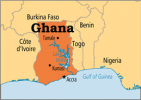The African Development Bank (AfDB) and Climate Investment Funds’ Forest Investment Program (CIF FIP) sign loan of $24-million today with Form Ghana Ltd to restore Ghana’s forests. First disbursement of the loan is expected to take place in the first half of 2017.
The agreement is believed to open the door to commence the implementation of an innovative project on Public-Private Partnership for the Restoration of Degraded Forest Reserve through Verified Carbon Standard (VCS) and Forest Stewardship Council (FSC) Certified Plantations.
Form Ghana Ltd., a forest plantation management company that contributes to large-scale reforestation of degraded forest areas in Ghana, was engaged by AfDB, FIP and the Government of Ghana (GoG) to undertake this innovative Public-Private Partnership (PPP) project in its forest sector.
Approved in September 2016, the project will be backed by a US $10-million concessional loan from the FIP and supplemented by $14 million in co-financing from the AfDB. The project is Ghana’s first forest sector PPP due to a tripartite Benefit Sharing Agreement signed between GoG through the Forestry Commission of Ghana with Form Ghana acting as project sponsor and traditional land owners.
Ghana’s forests, which once covered a third of its 24-million-hectare landmass, have been degraded at an alarming rate by excessive and often illegal logging, slash-and-burn agriculture, mining and quarrying, and fuelwood collection.
The project aims to help reverse this trend by restoring and expanding an existing 5,000 ha forest plantation to nearly 12,000 ha of sustainable commercial forest plantation made up of 10% indigenous tree species and 90% teak. Importantly, the program will conform to both Forest Stewardship Council and Verified Carbon Standard certification standards.
“As a premier development partner for Africa’s forest-rich countries, we feel it is incumbent on us to help establish pathways for partnerships with innovative private investors to revitalize the forest sector at the nexus of climate change and development. Africa’s forests are important gateways to green growth and sustainability, potentially providing both sustainable livelihoods and carbon sinks. Today’s loan agreement helps pave that pathway for Africa,” stated Anthony Nyong, AfDB’s Director of Climate Change and Green Growth.
Developed under the CIF’s competitive set-aside program to engage the private sector, the project is a first of its kind for the AfDB. “Today’s loan agreement signs into action the Bank’s first-ever private sector project in Ghana’s critical forest sector, and we applaud the Government of Ghana and its partner Form Ghana Ltd. for leading the way,” stated Leandro Azevedo, AfDB’s Senior Climate Finance Officer and project co-task manager.
The project is designed to support a new business model that will serve as an example to other investors, producing wood products which have the quality and sustainability stamp that will help meet increasing market demand while avoiding pressure on natural forests.
In line with CIF and AfDB standards, the project has been structured through extensive engagement with all stakeholders throughout the country. Expected outcomes from the project include: net greenhouse gas sequestration potential of around 2.8 million tonnes of carbon dioxide (tCO2) over 40 years (a long-term average of 70,103 tCO2 per year); 11,700 hectares of sustainably managed forest plantation with FSC and VCS certification; and 400 direct full-time jobs and 600 direct seasonal jobs.
The project includes ensuring that, in this heavily male-dominated industry, 40% of the jobs generated through the project will be held by women.
The project will help meet Ghana’s overarching FIP goals by addressing the underlying drivers of deforestation and catalyzing transformational change through up-front investment to support the country’s strategy on reducing emissions from deforestation and forest degradation, sustainable management of forests, and enhancing forest carbon stocks.
Established in 2008, as one of the largest fast-tracked climate financing instruments in the world, the US $8.3-billion CIF provides developing countries with grants, concessional loans, risk mitigation instruments, and equity that leverage significant financing from the private sector, MDBs and other sources.
Five MDBs – the African Development Bank (AfDB), Asian Development Bank (ADB), European Bank for Reconstruction and Development (EBRD), Inter-American Development Bank (IDB), and World Bank Group (WBG) – implement CIF-funded projects and programs.

